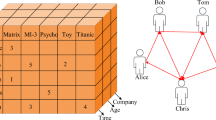Abstract
Most current researches on collaborative filtering recommendation generally improve the performance of traditional algorithm within its framework. Different from these studies, the paper presents new collaborative filtering framework by introducing a new gauss core based dependent function and an extension classification method. It builds matter-element classification by statistical information from input data, and recommends results by calculating dependent degree between characteristics of classification set and that of target object. Since it uses the dependent degree between user and classification set rather than the similarity between users or items in traditional algorithms, this method can be applied for various kinds of attributes value and can naturally shield data sparsity problem. Furthermore, it not only copes with several limitations of the traditional recommendation algorithm, but also resolves intrinsic problems of traditional extension dependent algorithm. The data experiments show the robustness, higher efficiency and better performance of our new algorithm.









Similar content being viewed by others
References
Borchers, A., Herlocker, J., Konstan, J., et al.: Ganging up on information overload. Computer 31(4), 106–108 (1998)
Zenebe, A., Norcio, A.F.: Representation, similarity measures and aggregation methods using fuzzy sets for content-based recommender systems. Fuzzy Sets Syst. 160(1), 76–94 (2009)
Park, H.S., Park, M.H., Cho, S.B.: Mobile information recommendation using multi-criteria decision making with bayesian network. Int. J. Inf. Technol. Decis. Mak. 14(2), 317–338 (2015)
Huang, J.J., Yuan, X.: Modeling tag-aware recommendations based on user preferences. Int. J. Inf. Technol. Decis. Mak. 14(5), 947–970 (2015)
Su, X.Y., Khoshgoftaar, T.M., Greiner, R.: A mixture imputation-boosted collaborative filter. In: Proceedings of the 21st International Florida Artificial Intelligence Research Society Conference. Coconut Grove, USA, pp. 312–316 (2008)
Jeong, B., Lee, J., Cho, H.: An iterative semi-explicit rating method for building collaborative recommender systems. Expert Syst. Appl. 36(3), 6181–6186 (2009)
Anand, D., Bharadwaj, K.K.: Utilizing various sparsity measures for enhancing accuracy of collaborative recommender systems based on local and global similarities. Expert Syst. Appl. 38(5), 5101–5109 (2011)
Navgaran, D.Z., Moradi, P., Akhlaghian, F.: Evolutionary based matrix factorization method for collaborative filtering systems. In: Proceedings of the 21st Iranian Conference on Electrical Engineering. Mashhad, Iran, pp. 1–5 (2013)
Zhao, T., McAuley, J., King, I.: Leveraging social connections to improve personalized ranking for collaborative filtering. In: Proceedings of the 23rd ACM International Conference on Information and Knowledge Management. Shanghai, China, pp. 261–270 (2014)
Moradi, P., Ahmadian, S., Akhlaghian, F.: An effective trust-based recommendation method using a novel graph clustering algorithm. Phys. A 436(15), 462–481 (2015)
Zhou, G.Q., Jin, L., Zhang, W.C.: Collaborative filtering recommendation algorithm based on user influence. J. Comput. Appl. 36(1), 63–66 (2016). (in Chinese)
Liang, C.Y., Leng, Y.J.: Collaborative filtering based on information theoretic co-clustering. Int. J. Syst. Sci. 45(3), 589–597 (2014)
Wu, M.L., Chang, C.H., Liu, R.Z.: Integrating content-based filtering with collaborative filtering using co-clustering with augmented matrices. Expert Syst. Appl. 41(6), 2754–2761 (2014)
Lee, S.K., Park, S.C., Kahng, M.S., Lee, S.G.: PathRank: ranking nodes on a heterogeneous graph for flexible hybrid recommender systems. Expert Syst. Appl. 40(2), 684–697 (2013)
Yang, X.W., Guo, Y., Liu, Y.: A survey of collaborative filtering based social recommender systems. Comput. Commun. 41, 1–10 (2014)
Salakhutdinov, R., Mnih, A.: Bayesian probabilistic matrix factorization using Markov chain Monte Carlo. In: Proceedings of the 25th International Conference on Machine Learning. New York, USA, pp. 880–887 (2008)
Le, H.S.: HU-FCF: a hybrid user-based fuzzy collaborative filtering method in recommender systems. Expert Syst. with Appl. 41(15), 6861–6870 (2014)
Lucas, J.P., Luz, N., Moreno, M.N.: A hybrid recommendation approach for a tourism system. Expert Syst. Appl. 40(9), 3532–3550 (2013)
Cai, W., Yang, C.Y.: Basic theory and methodology on Extenics. Sci. China Press 58(13), 1190–1199 (2013). (in Chinese)
Yang, C.Y., Cai, W.: Extenics, 7th edn. Science Press, Beijing (2015). (in Chinese)
Cui, C.S., Lai, K., Chen, J.: Research on content-based recommendation of ecbased on basic element theory. J. Syst. Sci. Complex. 35(10), 1209–1218 (2015). (in Chinese)
Wang, M.W., Xu, X.Y., Li, J.A.: Novel model of set pair analysis coupled with extenics for evaluation of surrounding rock stability. Math. Probl. Eng. 2015, 9 (2015). https://doi.org/10.1155/2015/892549
Li, X.S., Tian, Y.J., Florentin, S., Rajan, A.: An extension collaborative innovation model in the context of big data. Int. J. Inf. Technol. Decis. Mak. 13(2014), 1–23 (2014)
Acknowledgements
This research was supported by the National Science Foundation Project of China (No. 71271191), Zhejiang Science Foundation Project of China (No. Y16G010035), and Ningbo Innovative Team: The intelligent big data engineering application for life and health (Grant No. 2016C11024).
Author information
Authors and Affiliations
Corresponding author
Rights and permissions
About this article
Cite this article
Xu, L.B., Li, X.S. & Guo, Y. Gauss-core extension dependent prediction algorithm for collaborative filtering recommendation. Cluster Comput 22 (Suppl 5), 11501–11511 (2019). https://doi.org/10.1007/s10586-017-1414-2
Received:
Revised:
Accepted:
Published:
Issue Date:
DOI: https://doi.org/10.1007/s10586-017-1414-2




